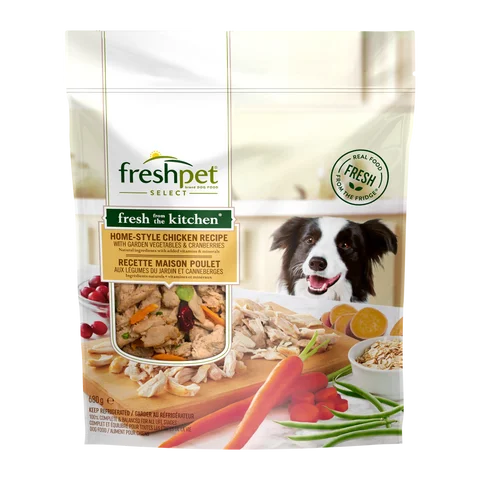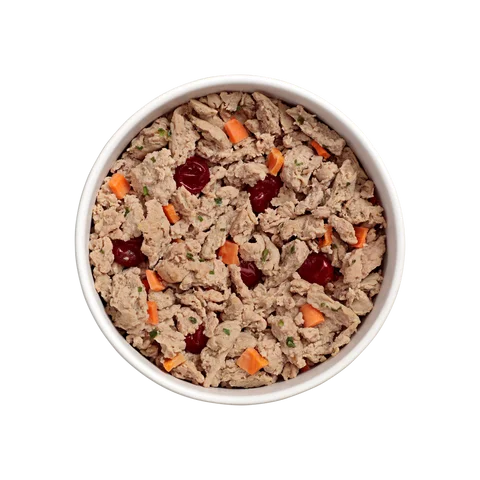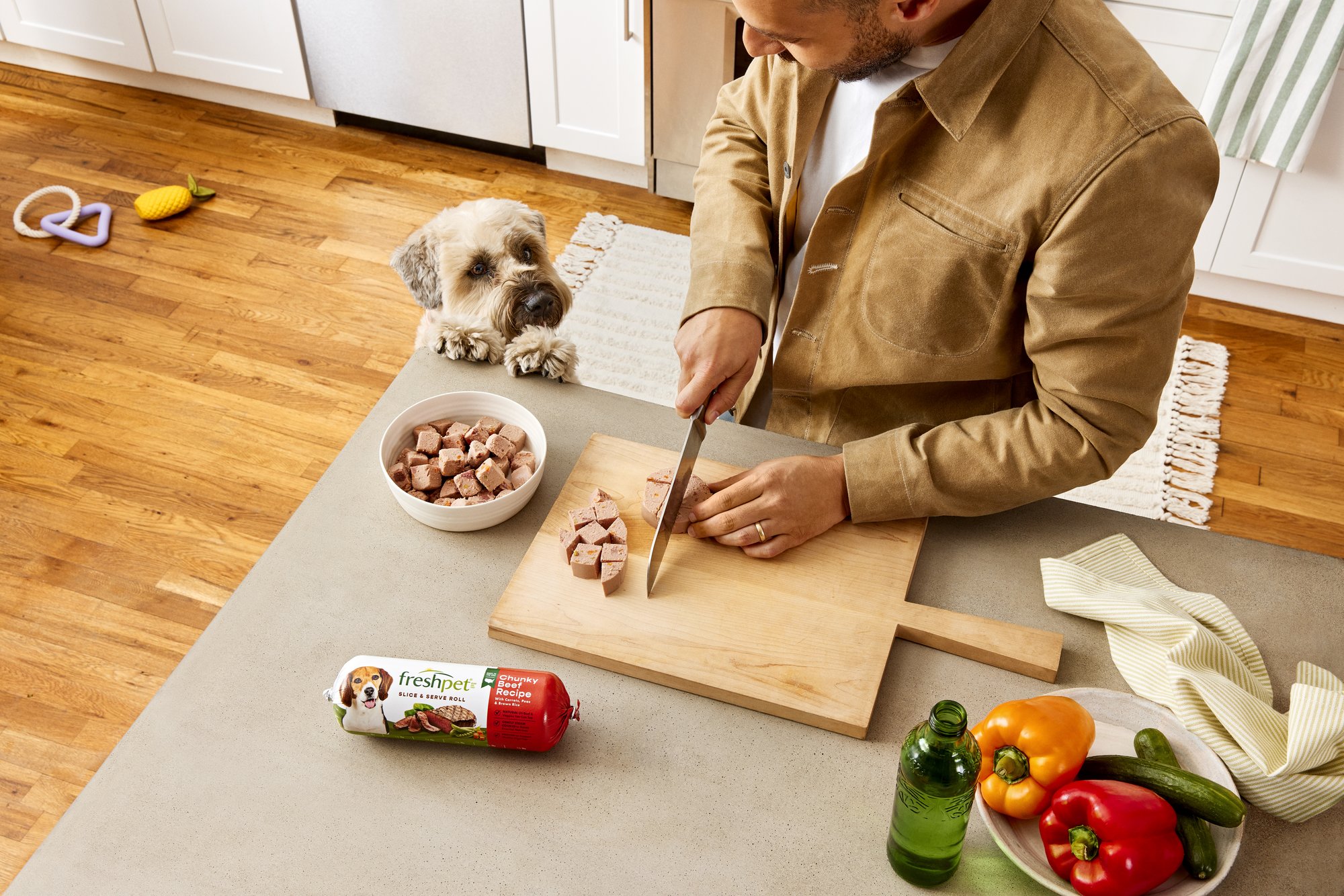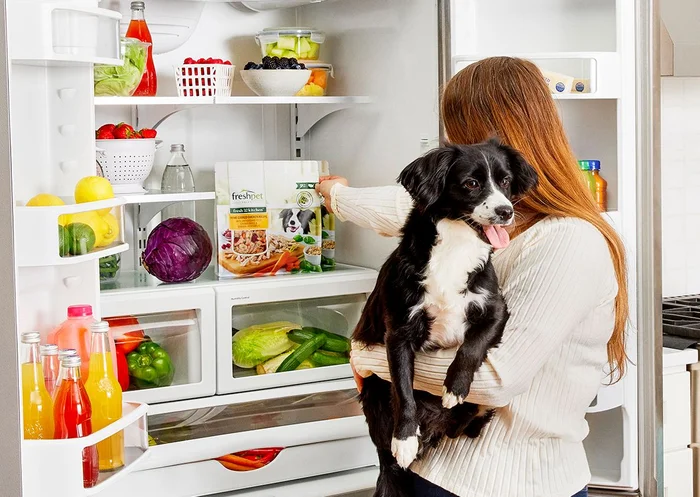


written by Tori Holmes
When it comes to allergies in dogs, food allergies are in the top five. Despite being so common, it can be hard to get to the root cause of food allergies. If you know – or suspect – your dog needs to make a switch to chicken-free dog food, read on. We’ve put together a deep dive covering everything you need to know about dog food for dogs with allergies, chicken allergies in dogs, including the best grain-free and chicken-free dog food.
Food allergies can be difficult to get to the bottom of, partially due to the wide range of symptoms dogs can display. A dog with a food allergy usually develops itchy skin or digestive problems, but they can experience more subtle changes such as:
What’s the best food for a puppy with allergies?
As you can see, food allergies can manifest themselves in a wide variety of ways. Dogs generally develop food allergies between six months and three years of age, so you’ll want to keep an eye out for these symptoms during this period.
Allergic reactions occur then the body’s immune system has an overreaction, triggered by a specific allergen. If your dog is allergic to chicken, that means that their immune system experiences this overreaction whenever it encounters poultry protein.
In other words, when dogs who are allergic to chicken consume anything that contains poultry protein, their body reacts the same way it would if it was fighting a viral or bacterial infection. The result of the body’s response to the protein often displays as either:
It’s important to note that an allergic reaction usually doesn’t happen the first time that the immune system is exposed to the allergen. In order for the immune system to recognize the protein and determine that it is an issue, it needs to come into contact with it more than once.
This means that dogs who end up developing chicken allergies often start by showing more mild intolerance-like symptoms, which may indicate that a full-blown food allergy is in the process of developing.
Since the symptoms of chicken allergies in dogs can be indicative of a number of issues, your vet will likely suggest an “elimination diet” to determine whether or not a food allergy is present. With an elimination diet, your pet will need to eat meals that don’t contain any ingredients they’ve eaten in the past.
Over the span of eight to 12 weeks, you will go through the five steps of the elimination diet:
Elimination diets can be considered a ‘home remedy for chicken allergies in dogs because as soon as the trigger protein is removed from their diet, most symptoms quickly fade.
In trying to determine what is the best dog food for dogs with allergies, after an elimination diet, what most pet parents find is that it’s the protein in their dog’s food that triggers their allergy. These can include:
Within this list, chicken is one of the most common culprits of food allergies in dogs. Knowing this, it’s safe to say that chicken is not good for some dogs. In fact, several breeds are genetically more prone to developing allergies, including:
If you have one of these breeds, it may be best to avoid chicken completely due to the increased chance of developing allergies.
What’s important to keep in mind is that food allergies in dogs are similar to those in people, meaning that they can appear from birth or form later in life. Similarly, food allergies experienced during puppyhood may also be outgrown over time whereas for other dogs they last a lifetime.
While chicken is a common protein in dog food, many alternative proteins can be used in chicken-free dog foods. For example:
If you want your dog to avoid animal proteins altogether, you can also opt for a completely plant-based diet. Plant-based dog food is a trend that has been steadily catching on in the industry as pet parents look for more ways to be sustainable and lower their carbon footprint.
In plant-based recipes, your dog will get the nutrients they need from high-protein plants and soy protein. Plant-based recipes often use eggs as well, so you’ll want to check and make sure that your pup’s chicken allergy doesn’t extend to chicken eggs as well.
When choosing a chicken-free dog food, the first thing you’ll want to do is check the label. Ingredient labels help us make informed choices about the foods we buy and the best chicken-free dog food (and grain-free dog foods) will have their ingredients clearly listed on the side of their packaging. To learn how to break down these labels so you can better understand why great ingredients make for happy, healthy pets, take a look at this blog by Freshpet vet, Dr. Aziza.
Another thing to consider when choosing any refrigerated dog food is the size of your dog. Large breeds, in particular, have specific dietary requirements due to their size.
Based on large breeds’ specific dietary requirements, we recommend one of our recipes tailored for larger breeds, such as:
Based on the outcome of the elimination diet, your vet may recommend avoiding more ingredients than just chicken in determining the best dog food for dogs with allergies. Depending on the severity of the allergy, some dogs need to avoid poultry altogether, which means recipes that contain turkey, duck, or even eggs must be avoided.
Best Chicken-Free Dog Food Options: While chicken is a common protein, there are a number of chicken-free dog food options available, including several Freshpet recipes. If you’re looking for grain-free, there are also some grain-free and chicken-free dog food recipes!
This high-protein recipe is verified non-GMO and made of 100% natural beef, lamb, and egg mixed with antioxidant-rich spinach and cranberries. You can find this healthy dog food in 5.5 lb. bags at PetSmart, Petco, and other specialty locations. This recipe contains eggs, which may be a problem for dogs with chicken allergies that include chicken eggs.
Pros of this chicken-free dog food:
2. NATURE’S FRESH® GRAIN-FREE SALMON & OCEAN WHITEFISH RECIPE
Made with salmon, ocean whitefish, spinach, cranberries, blueberries and sweet potatoes, this grain-free recipe is full of healthy proteins, vitamins and minerals. You can find 2 lb. rolls at Whole Foods and other specialty locations.
Pros of this chicken-free dog food:
3. HOMESTYLE CREATIONS™ NATURAL BEEF RECIPE
These Homestyle Creations™ patties are made from 100% pure beef and are free from grains, gluten, fillers, and soy. They can be served alone as a complete and balanced meal, or you mix and match them with any other Freshpet recipe and portion based on your dog's dietary needs. You can find 8 oz. pouches, which contain two patties, at select Whole Foods, Target, Meijer, and other specialty locations.
Pros of this chicken-free dog food:
4. VITAL® GRAIN-FREE BEEF & BISON RECIPE
This verified non-GMO, high-protein, grain-free roll is as tasty as it is healthy. Made of 100% natural beef and bison with antioxidant-rich spinach, blueberries and cranberries, you can find this natural dog food recipe in 1 lb., 2 lb., and 5 lb., rolls at PetSmart, Petco, and other specialty locations. Be sure to make sure that your pup is not allergic to beef.
Pros of this chicken-free dog food:

pet wellness
To make choosing houseplants a little bit easer, we’ve rounded up a list of eight that are safe for even the most curious of companions.

pet wellness
To help your pup transition to fresh food easier, we’ve put together a handy guide covering how much to feed your pet and other top nutritional questions.
